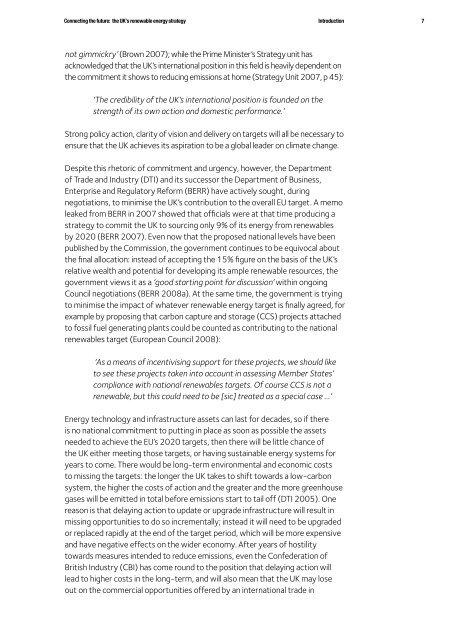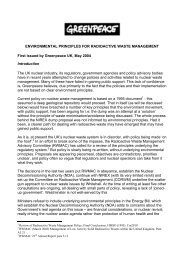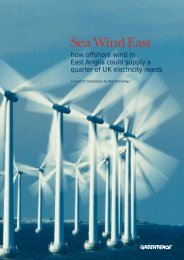Connecting the Future - Greenpeace UK
Connecting the Future - Greenpeace UK
Connecting the Future - Greenpeace UK
Create successful ePaper yourself
Turn your PDF publications into a flip-book with our unique Google optimized e-Paper software.
<strong>Connecting</strong> <strong>the</strong> future: <strong>the</strong> <strong>UK</strong>’s renewable energy strategy<br />
Introduction<br />
<br />
not gimmickry’ (Brown 2007); while <strong>the</strong> Prime Minister’s Strategy unit has<br />
acknowledged that <strong>the</strong> <strong>UK</strong>’s international position in this field is heavily dependent on<br />
<strong>the</strong> commitment it shows to reducing emissions at home (Strategy Unit 2007, p 45):<br />
‘The credibility of <strong>the</strong> <strong>UK</strong>’s international position is founded on <strong>the</strong><br />
strength of its own action and domestic performance.’<br />
Strong policy action, clarity of vision and delivery on targets will all be necessary to<br />
ensure that <strong>the</strong> <strong>UK</strong> achieves its aspiration to be a global leader on climate change.<br />
Despite this rhetoric of commitment and urgency, however, <strong>the</strong> Department<br />
of Trade and Industry (DTI) and its successor <strong>the</strong> Department of Business,<br />
Enterprise and Regulatory Reform (BERR) have actively sought, during<br />
negotiations, to minimise <strong>the</strong> <strong>UK</strong>’s contribution to <strong>the</strong> overall EU target. A memo<br />
leaked from BERR in 2007 showed that officials were at that time producing a<br />
strategy to commit <strong>the</strong> <strong>UK</strong> to sourcing only 9% of its energy from renewables<br />
by 2020 (BERR 2007). Even now that <strong>the</strong> proposed national levels have been<br />
published by <strong>the</strong> Commission, <strong>the</strong> government continues to be equivocal about<br />
<strong>the</strong> final allocation: instead of accepting <strong>the</strong> 15% figure on <strong>the</strong> basis of <strong>the</strong> <strong>UK</strong>’s<br />
relative wealth and potential for developing its ample renewable resources, <strong>the</strong><br />
government views it as a ‘good starting point for discussion’ within ongoing<br />
Council negotiations (BERR 2008a). At <strong>the</strong> same time, <strong>the</strong> government is trying<br />
to minimise <strong>the</strong> impact of whatever renewable energy target is finally agreed, for<br />
example by proposing that carbon capture and storage (CCS) projects attached<br />
to fossil fuel generating plants could be counted as contributing to <strong>the</strong> national<br />
renewables target (European Council 2008):<br />
‘As a means of incentivising support for <strong>the</strong>se projects, we should like<br />
to see <strong>the</strong>se projects taken into account in assessing Member States’<br />
compliance with national renewables targets. Of course CCS is not a<br />
renewable, but this could need to be [sic] treated as a special case …’<br />
Energy technology and infrastructure assets can last for decades, so if <strong>the</strong>re<br />
is no national commitment to putting in place as soon as possible <strong>the</strong> assets<br />
needed to achieve <strong>the</strong> EU’s 2020 targets, <strong>the</strong>n <strong>the</strong>re will be little chance of<br />
<strong>the</strong> <strong>UK</strong> ei<strong>the</strong>r meeting those targets, or having sustainable energy systems for<br />
years to come. There would be long-term environmental and economic costs<br />
to missing <strong>the</strong> targets: <strong>the</strong> longer <strong>the</strong> <strong>UK</strong> takes to shift towards a low-carbon<br />
system, <strong>the</strong> higher <strong>the</strong> costs of action and <strong>the</strong> greater and <strong>the</strong> more greenhouse<br />
gases will be emitted in total before emissions start to tail off (DTI 2005). One<br />
reason is that delaying action to update or upgrade infrastructure will result in<br />
missing opportunities to do so incrementally; instead it will need to be upgraded<br />
or replaced rapidly at <strong>the</strong> end of <strong>the</strong> target period, which will be more expensive<br />
and have negative effects on <strong>the</strong> wider economy. After years of hostility<br />
towards measures intended to reduce emissions, even <strong>the</strong> Confederation of<br />
British Industry (CBI) has come round to <strong>the</strong> position that delaying action will<br />
lead to higher costs in <strong>the</strong> long-term, and will also mean that <strong>the</strong> <strong>UK</strong> may lose<br />
out on <strong>the</strong> commercial opportunities offered by an international trade in




![[2007] EWHC 311 - Greenpeace UK](https://img.yumpu.com/22079793/1/184x260/2007-ewhc-311-greenpeace-uk.jpg?quality=85)











